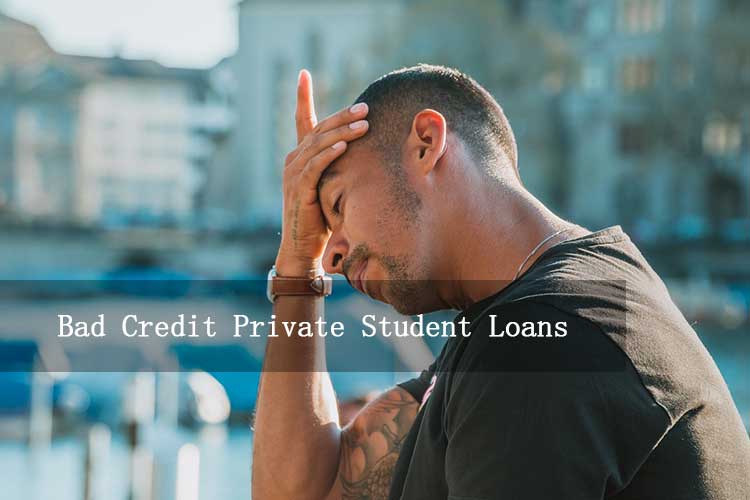
Many students depend on student loans to help pay for their education, but if you have poor credit, obtaining private loans can seem quite difficult. Lenders often use credit scores to assess eligibility and set interest rates, which can make it tough for individuals with low scores to find reasonable financing. Nevertheless, having bad credit doesn’t mean you’re out of options. In this guide, we’ll explore how to find the best bad credit private student loans and what steps you can take to increase your chances of approval.
What Are Bad Credit Private Student Loans?
Private student loans for individuals with bad credit cater to those who have low credit scores or minimal credit history. Unlike federal loans, these private loans are provided by banks, credit unions, or online lenders, and typically require either a solid credit score or a cosigner to secure approval.
When seeking a private student loan with poor credit, lenders view the risk as greater, which can lead to higher interest rates or more stringent loan conditions. Nevertheless, some lenders focus on offering loans to students with bad credit, and knowing how these loans function can assist you in managing this financial hurdle.
How Does Credit Affect Your Student Loan Application?
Your credit score plays a critical role in determining whether you’ll be approved for a private student loan. Lenders assess your creditworthiness to gauge the likelihood of timely repayment. Here’s how credit can impact your loan application:
- Interest Rates: With bad credit, you are likely to receive higher interest rates, increasing the cost of borrowing.
- Approval Chances: Many lenders deny applications from borrowers with credit scores below a certain threshold.
- Loan Terms: If approved, loans may have less favorable repayment options or stricter conditions.
Options for Bad Credit Private Student Loans
Although getting a private student loan with bad credit may seem difficult, it’s not impossible. Here are some available options:
- Lenders Specializing in Bad Credit Loans:
Some private lenders specifically cater to borrowers with poor credit. These lenders often look beyond credit scores and may focus on your income, academic performance, or school enrollment status. - Credit Unions and Community Banks:
Smaller financial institutions may offer more flexible loan terms for students with bad credit, especially if you have a long-standing relationship with them. - Online Lenders:
Several online platforms provide private student loans and have options for borrowers with poor credit. Some lenders also offer prequalification, allowing you to see potential loan offers without impacting your credit score.
How a Cosigner Can Help Your Application
If your credit score is preventing you from securing a loan, adding a cosigner with strong credit can significantly improve your approval chances. A cosigner agrees to share responsibility for the loan, reducing the lender’s risk. Here’s how a cosigner can benefit you:
- Lower Interest Rates: Adding a cosigner may result in more favorable interest rates.
- Better Loan Terms: Lenders may offer more flexible repayment plans.
- Easier Approval: With a creditworthy cosigner, you are more likely to get approved.
However, it’s essential to understand that the cosigner will be equally liable for the loan, and missed payments can affect their credit as well.
Can You Get a Loan Without a Cosigner?
If finding a cosigner isn’t an option, some lenders offer private student loans without a cosigner. These loans typically require you to meet other eligibility criteria, such as:
- High Income: You may need to demonstrate a stable source of income.
- Enrollment in a High-Demand Program: Some lenders prefer students in programs with strong job prospects.
- Established Credit History: Although a high credit score isn’t required, having some credit history helps.
How to Improve Your Credit Before Applying
If you have time before you need to apply for a loan, working to improve your credit score can open more doors. Here are some strategies to boost your score:
- Pay Down Existing Debt: Reducing your debt balances will improve your debt-to-income (DTI) ratio and raise your credit score.
- Check Your Credit Report: Review your credit report for any errors or discrepancies, and dispute them if necessary.
- Make Timely Payments: Consistently paying your bills on time is one of the most effective ways to build your credit over time.
- Avoid New Debt: Applying for new credit can temporarily lower your score, so try to minimize new debt inquiries before applying for a student loan.
Other Ways to Fund Your Education with Bad Credit
Private loans aren’t your only option. Explore these alternatives to cover your education expenses:
- Federal Student Loans: Federal loans don’t require a credit check (except for PLUS loans) and often offer lower interest rates and flexible repayment plans.
- Scholarships and Grants: Unlike loans, scholarships and grants don’t need to be repaid, making them an ideal source of funding.
- Work-Study Programs: Many schools offer work-study jobs that allow you to earn money while pursuing your degree.
- Tuition Reimbursement Programs: Some employers offer financial assistance to employees pursuing higher education.
Managing Your Loans After Graduation
Once you’ve secured a loan, managing your debt responsibly is crucial. Here are some tips to stay on track:
- Set Up Automatic Payments: Many lenders offer interest rate discounts for enrolling in autopay.
- Explore Refinancing: If your credit improves over time, refinancing your loan can lower your interest rate and monthly payments.
- Communicate with Your Lender: If you experience financial difficulties, contact your lender to explore repayment options, such as deferment or forbearance.
Conclusion
Although having poor credit can complicate the process of obtaining a private student loan, it is still achievable. By familiarizing yourself with your options, considering a cosigner if you can, or working on improving your credit score prior to applying, you can enhance your chances of getting approved. Furthermore, looking into scholarships, grants, and federal loans can help lessen your need for private loans.
Finding the best bad credit private student loans requires research and careful planning. Take the time to compare different lenders, interest rates, and loan terms to make well-informed choices and steer clear of unnecessary financial burdens. With the right approach, you can fund your education and reach your academic aspirations, even if your credit isn’t in the best shape.



